Watching a lot of Celtic games recently got me thinking about how they play, why Ronny Deila has come under so much pressure and why they are different to many of the other sides who dominate their respective leagues.
The answer struck me when watching Barcelona versus Atletico Madrid in the first leg of their Champions League Quarter-Final.
Despite facing ten men and with Atletico sitting very deep Barcelona kept the ball and continued to try and work positions for Great and Good Chances, which have a significantly higher conversion rate than Attempts.
While I am in no way comparing Celtic to Barcelona in terms of quality, they do face similar problems when playing domestically. Opponents tend to sit deep and be very compact against them, allowing them to control the ball 30 or 40 yards out and restricting the space in behind. However, in contrast to Barcelona I had observed that Celtic are very happy to have lots of Attempts, sacrificing the possibility of creating better chances by keeping the ball.
This led to further thoughts about how Attempts might affect the Total Goals Line in games. Given the conversion rates for Great and Good Chances it means that leagues with more of these should have higher starting lines. Indeed, I would expect to see a trend where games with low lines have a higher proportion of Attempts than Great or Good Chances.
The graphic below shows the difference in the most common total goals line across 15 competitions covered by StrataBet. These competitions are generally taken from the start of the 2015/16 season to date, though Japan J League and Norway Eliteserien look at the entire 2015 season:
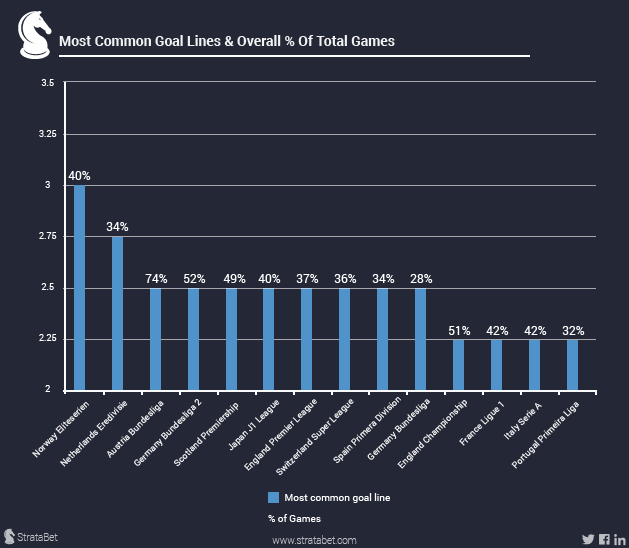
From this table it is easy to see that Norway has a much higher goal line than the English Championship, meaning that more goals would be expected to be scored in their games.
If more goals are expected, then the proportion of Great and Good Chances should also be higher to account for this.
Using StrataData I investigated this theory and there does appear to be some correlation. Of the leagues with low goal lines, three of the four lowest (those with 2.25 as the common line) also appear as three of the four lowest in terms of the number of Attempts per Great Chance created:
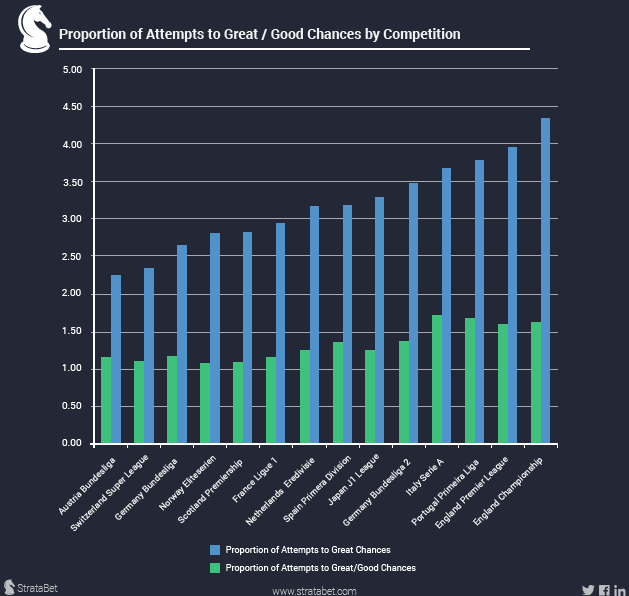
The outlier here is France Ligue 1, where Great Chances are created but the goal lines are low and the fewest goals per game are scored of the big five leagues.
The English Premier League and Championship also fall into this category, but in the Premier League 32% of games had a goal line of 2.25. The difference between that and the most frequent of 2.5 (37%) is a relatively small amount, making this understandable.
Austria, Switzerland and Germany Bundesliga appear to be the polar opposite of this, with fewer Attempts taken and more Great Chances created. This fits well in Switzerland, with 64% of games having a starting goal line of >2.5 and 49% of German Bundesliga games having the same.
The graphic below shows this in more detail, so that we can see the leagues where more goals are expected on a regular basis:
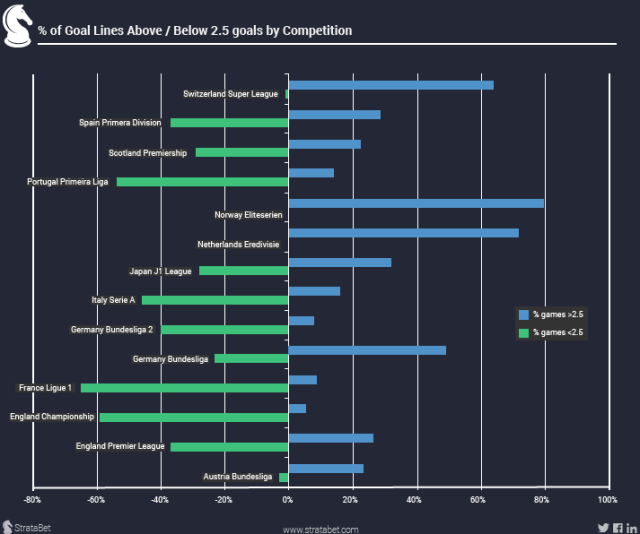
Germany and Switzerland are only behind Netherlands and Norway in terms of the number of games where over 2.5 goals would be expected.
So how does this relate back to Celtic?
Looking at teams who dominate their league we can see if they typically play like Barcelona in terms of keeping the ball and waiting for better chances, or if they simply shoot often and from wherever possible.
For this I have chosen teams from the top three of all the leagues mentioned who are at least 15 points clear of the team in fourth and the table below brings up some interesting points to note:
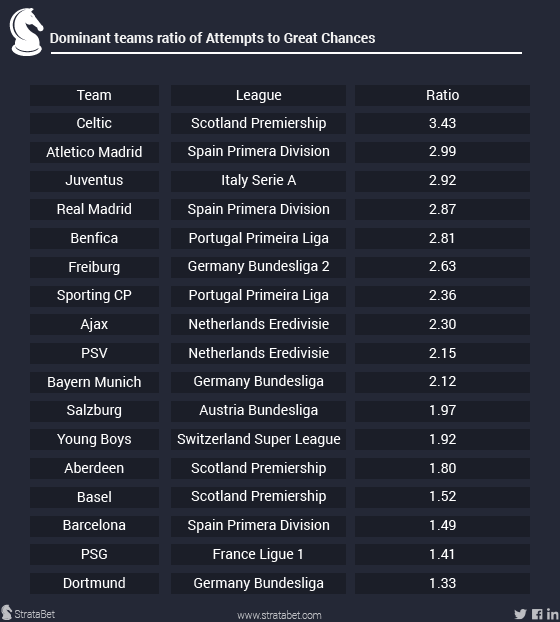
As suspected, Celtic lead this table by quite a distance from the rest. For every Great Chance they create they have ~3.5 Attempts, which is significantly more than Barcelona, Dortmund and PSG, who have ~1.5 Attempts per Great Chance.
This does not necessarily mean what Celtic are doing is wrong, but the question would be is this repeatable? We would expect the number of Attempts Celtic have had to result in ~6 goals, though they have actually scored 14. This says that they are either lucky and doing better than we’d expect or that they are confident the quality of strike they can produce from poor positions can beat the quality of goalkeeper the opposition has.
Ultimately there is no singular proven way of playing successful football regardless of personnel. Surprisingly it is Juventus who lead this list of teams if you include the number of Attempts taken compared to both Great AND Good Chances created, despite being a fantastic side. However, what it does show is the style that teams like to play in:
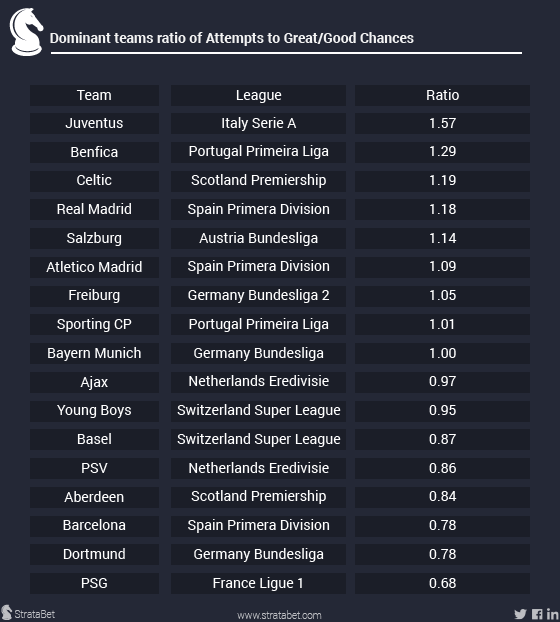
The teams at the lower end are more content to wait for better chances to come, knowing that they have the quality to keep creating rather than taking longer shots. The teams at the higher end are apparently confident in their ability to shoot from range, which can be a useful tactic in many situations. It can keep opponents guessing and also opens up opportunities for strikers to get on the end of rebounds and to win more corners.
What should be noted here is that almost all the teams in these tables are at the top end of creating Great and Good Chances in each of their respective leagues. As such, even though they may be registering a lot of Attempts they are still creating better quality chances on a regular basis than most other teams in their league.
Of course Attempts are not always a bad thing but teams that favour these over Great and Good Chances may struggle when the standard of opposition increases, such as in European competition when chances can often be at a premium. Celtic are the prime example of this as they dominate the Scottish Premiership but have failed to make much of a dent during their recent Champions League and Europa League campaigns.
It will be interesting to see how much Ronny Deila’s successor changes their style of play and attitude towards chance creation and if this improves their fortunes on the grander stage.
This blog was originally available at StrataBet Trading Expert.